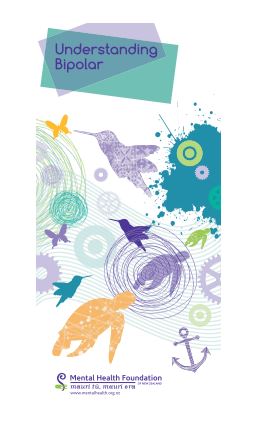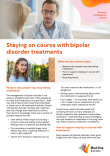Scam alert: Ads or websites claiming to have Medsafe approval or with the Medsafe logo are fake. Medsafe doesn’t endorse any health products, services or brands. Go to Medsafe for official information.
Bipolar disorder | Mate rangirua
Also known as bipolar affective disorder
Key points about bipolar disorder
- Bipolar disorder (mate rangirua) is a mood disorder in which you experience extreme high moods (mania) and extreme low moods (depression). It used to be called manic depression.
- First episodes tend to occur in people under 25 years of age.
- Most people with the condition remain well for long periods. However, the earlier a diagnosis is made, the better the recovery usually is.
- Treatment includes medication for acute episodes of mania or depression, and mood stabilisers to keep episodes at bay.
- It can be a frightening, overwhelming experience, but there's crisis help and psychological support to help you.
- While there is no cure for bipolar disorder, many people have learned to manage their symptoms and live happy and fulfilling lives.

VIDEO: Bipolar disorder – animated short film
The word bipolar describes the mood fluctuations – from the extremely elated mood (mania) to the very low mood (depression) – that people with this condition experience.
We all have mood swings and times of feeling low or excited. With bipolar disorder, these mood swings are more extreme and affect your ability to carry out normal daily tasks. These mood swings can last days, weeks or months.
Bipolar disorder has been experienced by some of the greatest writers, medical people, musicians, artists and scientists in history, such as Sir Isaac Newton, Florence Nightingale and Mark Twain.
However, experiencing bipolar disorder can be an overwhelming, frightening and isolating experience.
If you are in crisis, you may feel that you can't control your extremely negative emotions or grandiose feelings and you may regret actions you carried out while in an elevated mood. It may seem as if your world has fallen apart, that everything is black, that nothing makes sense or that you are in danger. Please get crisis help(external link)(external link) right away if you feel like this.
The cause of bipolar disorder remains unclear. However, factors believed to play a role include genetics, brain chemicals, social and environmental factors, substance abuse and medical illnesses. Sometimes its onset can be linked to a stressful or traumatic life event.
Genetic factors are thought to account for about 60–80% of the cause of the condition. If one parent has bipolar disorder, there is a 10–25% chance that his or her child will develop the illness. If both parents have bipolar disorder, the likelihood of their child developing the illness is about 10–50%.
Bipolar mood changes are called mood episodes. You may have manic or hypomanic (milder mania) episodes, depressive episodes or mixed episodes (which include both manic and depressive symptoms). Elated mood can range from fairly mild through to extremely elated mood, known as mania.
In a manic episode you may:
- feel very up or high
- feel jump or wired
- feel extremely energised despite a lack of need for sleep over several days
- have exaggerated self-confidence
- talk really fast about a lot of different things
- be agitated, easily irritable or touchy
- have trouble relaxing or sleeping
- think you can do a lot of things at once and be more active than usual
- do risky things, like spend a lot of money or engage in sexual activities outside of your normal sexual behaviour.
Depression might be identified by extreme tiredness despite sleeping a lot, bouts of uncontrollable crying, loss of interest and motivation, feeling hopeless, helpless or worthless for some time and having thoughts about dying.
In a depressive episode you may:
- feel very down or sad
- feel worried and empty
- have trouble concentrating
- forget things a lot
- lose interest in fun activities and become less active
- feel tired or slowed down
- have trouble sleeping
- think about death or suicide.
These behaviours may develop slowly, so it can be hard to tell whether some are part of your normal character. It can be helpful to ask significant others in your life who know you well whether they have noticed some unusual behaviour. In extreme cases, the symptoms are very intense and you may put yourself or others at risk or feel ashamed after you have recovered.
You can do a self-test to see if you might have the symptoms of bipolar disorder: Self-test for bipolar disorder(external link)(external link) Black Dog Institute, Australia.
If you think you or someone you care about has these symptoms, see your family doctor (GP). The earlier a diagnosis is made, the better the recovery usually is.
Your doctor may do a physical examination and ask for blood test to rule out any other conditions that may be causing your symptoms. If they think you might have bipolar disorder, they will assess your symptoms to see if they meet the criteria from the American Psychiatric Association’s Diagnostic and Statistical Manual of Mental Disorders 5th edition (DSM-5).
Bipolar disorder includes 2 different conditions – bipolar I and bipolar II.
- Bipolar I disorder is a manic-depressive disorder that can exist both with and without psychotic episodes.
- Bipolar II disorder consists of depressive episodes (which can range from mild to severe) and at least one hypomanic episode that does not inhibit normal everyday functioning. If a full manic episode has been experienced, a diagnosis with Bipolar I Disorder is warranted.
To be diagnosed with bipolar disorder, you must have experienced at least 1 episode of mania or hypomania.
To be considered mania, the elevated, expansive or irritable mood must last for at least 1 week and be present most of the day, nearly every day. To be considered hypomania, the mood must last at least 4 days in a row and be present most of the day, almost every day.
During this period, 3 or more of the following symptoms must be present and represent a significant change from usual behaviour:
- inflated self-esteem or grandiosity
- decreased need for sleep
- increased talkativeness
- racing thoughts
- easily distracted
- increased goal-directed activity or agitated movement
- engaging in activities that hold the potential for painful consequences, eg, unrestrained buying sprees.
The depressive side of bipolar disorder is characterised by a major depressive episode resulting in depressed mood or loss of interest or pleasure in life. You must experience 5 or more of the following symptoms in 2 weeks to be diagnosed with a major depressive episode:
- depressed mood most of the day, nearly every day
- insomnia or hypersomnia
- loss of interest or pleasure in all, or almost all, activities
- significant weight loss or weight gain, or decrease or increase in appetite
- engaging in purposeless movements, such as pacing the room, or the opposite, minimal physical movement/activity
- fatigue or loss of energy
- feelings of worthlessness or guilt
- diminished ability to think or concentrate, or indecisiveness
- recurrent thoughts of death, recurrent suicidal ideation without a specific plan, or a suicide attempt.
In addition, these symptoms must cause significant impairment in everyday functioning and not be caused by substance use, medication, or other mental health problems.
If your doctor thinks you have bipolar disorder, they may refer you to a psychologist or psychiatrist.
With help and support from family and friends, most people learn to manage their bipolar disorder and get on with life. You are likely to have times when you are well and times when you are unwell. The treatment with medication offered by your doctor or psychiatrist is tailored to your needs to help you recover from periods of illness so you get back to your normal moods and behaviours. They then adjust your treatment to help you remain well.
Medical treatment is usually accompanied by psychological support to learn about the triggers and identify the early warning signs of your symptoms, and to teach you effective and healthy coping strategies.
Most people return to their usual level of functioning after times of illness, although about 1 in 5 will have some ongoing difficulties.
Medication
There are several medicines that have been shown to be helpful in relieving depression and others that are useful in stabilising moods. It is quite common for people with bipolar disorder to be taking some medication long term. Your doctor can help you find the ones that suit you best without causing unnecessary side effects.
Treatment for bipolar disorder can be tricky, when compared to treating (unipolar) depression, because taking an antidepressant drug at the wrong time runs the risk of 'flipping' your depression into a manic mood. This means that mood stabiliser drugs and antidepressants are used carefully, and introduced gradually.
You may be referred to a psychiatrist so that your mood problems and the best treatment for you can be worked out early on. Even so, there may be some trial and error until the best combination for you is worked out.
Talking to your doctor will help you understand your moods and regain control of your life.
Commonly used mood stabilising medications are Lithium, Valproate and Carbamazepine. Sometimes antipsychotic medicines (eg, Olanzapine and Quetiapine) or antidepressants (eg, Fluoxetine, Paroxetine and Citalopram) are also useful.
If you are taking lithium, you will need regular blood tests to check the right amount is being given. The mood benefits may take a few months to really be noticed. If the lithium level in your blood gets too high you may notice shakes and twitches, weakness, slurred speech, sleepiness, stomach cramps, loss of appetite and vomiting. Contact your doctor, psychiatrist or practice nurse right away. Stop the lithium if you can't contact your doctor.
Also talk to your doctor, nurse or psychiatrist if your other medications appear to cause you problems. They can check you have the most appropriate medication at the right dose. Your doctor will be happy to talk about any medication side effects that might be a problem. Depending on the medicine, these can include weight gain, stomach problems, slowed thinking, tremors (shakes, twitches) or nausea.
The use of medications during pregnancy needs consultation with an expert. Taking your medication every day as directed is important for keeping well long term.
Talking therapy
Psychotherapy can help you develop skills and strategies to manage the condition. It also gives you a non-judgmental place to deal with any emotions, such as sadness, guilt, anger or shame.
Electroconvulsive therapy (ECT)
In some circumstances, electroconvulsive therapy (ECT) might be recommended.
There is much you and your family/whānau can do to help you develop skills and strategies for reducing mood swings and staying well.
- Exercise helps your mental as well as physical wellbeing (the benefits can be substantial).
- Avoid all alcohol and illegal drugs (they cause mood changes).
- Eat a healthy, balanced diet.
- Develop a good sleep routine and get a good sleep every night – a few nights of poor sleep can trigger a manic episode, so if sleep is a problem ask your doctor about ways to help you sleep (which may include medication).
- Learn about your condition and ways different people manage it.
- Try to keep your life balanced and learn how to manage stress.
- Learn your warning signs so you can get help early before your mood becomes too high or low.
- Talk to trusted friends and relatives about bipolar disorder so they can be there for you when you need it.
- Keep a Daily Mood Swing diary(external link)(external link) to rate your moods from 1–10 and record factors affecting your mood and sleep. This helps to detect changes early.
- Find out if there is a self-management programme near you.
Apps reviewed by Healthify
You may find it useful to look at some Mental health and wellbeing apps.
Stories from people who live with bipolar disorder.
Some of the world's most creative and productive people live with bipolar disorder and achieve feats the rest of us only dream of! This includes some of the greatest writers, medical people, musicians, artists and scientists in history, such as Sir Isaac Newton, Florence Nightingale and Mark Twain.
There are plenty of ordinary Kiwis also who have found ways to live well with bipolar disorder. Find out some of their stories here from the Mental Health Foundation NZ(external link).
Gina's story
Gina's diagnosis of bipolar disorder is no longer the sole focus in her life – now her energy is on advocacy and mental health promotion. Read Gina's story(external link) (Mental Health Foundation, NZ)
Debbies's story
Debbie's journey with bipolar disorder took her between three countries, finally to overcome stigma and find a meaningful life. Read Debbie's story(external link) (Mental Health Foundation, NZ)
Loren's story
10 lessons from 10 years with Bipolar Disorder. Read Loren Eley(external link) (Mental Health Foundation, NZ)
Reverend Imoa Setefano's story
Reverend Imoa Setefano talks about living with bipolar disorder – he wants the community to learn about people before judging them.
Video: Living with Bipolar Disorder
This video may take a few moments to load.
(AttitudeLive, NZ, 2013)
Video: Rod's story
Rod's story of diagnosis, treatment and learning to live well with bipolar disorder. This video may take a few moments to load.
(NHS, UK, 2009)
Video: My bipolar diagnosis was a gift
Lianca Lyons was diagnosed with Bipolar Disorder in 2013. She shares her story in this video. This video may take a few moments to load.
(TedX Talks, UK, 2010)
Video: Bipolar Disorder and What I Would Tell #MyYoungerSelf | Stephen Fry
Stephen Fry talks about his childhood experience with bipolar disorder. This video may take a few moments to load.
(Child Mind Institute, UK, 2017)
Bipolar affective disorder(external link)(external link) Mental Health Foundation, NZ
Bipolar disorder – for young people(external link)(external link) Royal College of Psychiatrists, UK
What is bipolar disorder?(external link)(external link) Balance Aotearoa, NZ
Bipolar disorder(external link)(external link) Black Dog Institute, Australia
Apps
Mental health and wellbeing apps
Resources
Note: Some resources are from overseas so some details may be different in New Zealand, eg, phone 111 for emergencies or, if it’s not an emergency, freephone Healthline 0800 611 116.
- Understanding bipolar disorder(external link)(external link) Mental Health Foundation of NZ, 2014
- Bipolar disorder – self-testing(external link)(external link) Black Dog Institute, Australia, 2012
- Living well with bipolar disorder(external link)(external link) Balance NZ and Mental Health Foundation, NZ
- Bipolar fact sheets Black Dog Institute, Australia
- Bipolar disorder in young people(external link) [PDF, 878 KB]
- Causes of bipolar disorder(external link)[PDF, 767 KB]
- Staying on course with bipolar disorder treatments(external link) [PDF, 866 KB]
- Symptoms of bipolar disorder(external link) [PDF, 432 KB]
- Treatments for bipolar disorder(external link) [PDF, 298 KB]
- Bipolar disorder treatments during pregnancy and the postnatal period(external link) [PDF, 765 KB]
- Daily mood chart for bipolar disorder(external link) [PDF, 592 KB]
- Lamotrigine-associated rash(external link) [PDF, 338 KB]
- A guide to talking therapies in NZ(external link) Te Pou, NZ, 2010
- He rongoā kei te kōrero – talking therapies for Māori (external link)Te Pou, NZ, 2010
- Talking therapies for Asian people(external link) Te Pou, NZ, 2010
- Talking therapies for Pasifika peoples(external link) Te Pou, NZ, 2010
|
The content on this page will be of most use to clinicians, such as nurses, doctors, pharmacists, specialists and other healthcare providers. |
Clinical guidelines
- Bipolar disorder – identifying and supporting patients in primary care(external link)(external link) BPAC, NZ, 2014
- Clinical practice guidelines for mood disorders(external link)(external link) RANZCP, 2016
- Malhi GS, Bell E, Boyce P, et al. The 2020 Royal Australian and New Zealand College of Psychiatrists clinical practice guidelines for mood disorders – bipolar disorder summary(external link)(external link) Bipolar Disord. 2020 Dec;22(8):805-821. doi: 10.1111/bdi.13036.
Other clinical resources
- Bipolar II disorder – modelling, measuring and managing(external link)(external link) Gordon Parker (ed.), 2012
- What treatments work for bipolar disorder? Evidence-based view(external link)(external link) Best Health, UK
- Assessment and management tools for health professionals(external link)(external link) Black Dog Institute, Australia
- Cunningham R, Stanley J, Haitana T, et al. The physical health of Māori with bipolar disorder(external link)(external link) Aust N Z J Psychiatry. 2020 Nov;54(11):1107-1114.
Apps
Brochures

Mental Health Foundation of NZ, 2014

Staying on course with bipolar
disorder treatments Black Dog Institute, Australia
Credits: Healthify editorial team. Healthify is brought to you by Health Navigator Charitable Trust.
Reviewed by: Dr Dr Adrienna Ember, Clinical Psychologist, Waikato
Last reviewed:
Page last updated:





